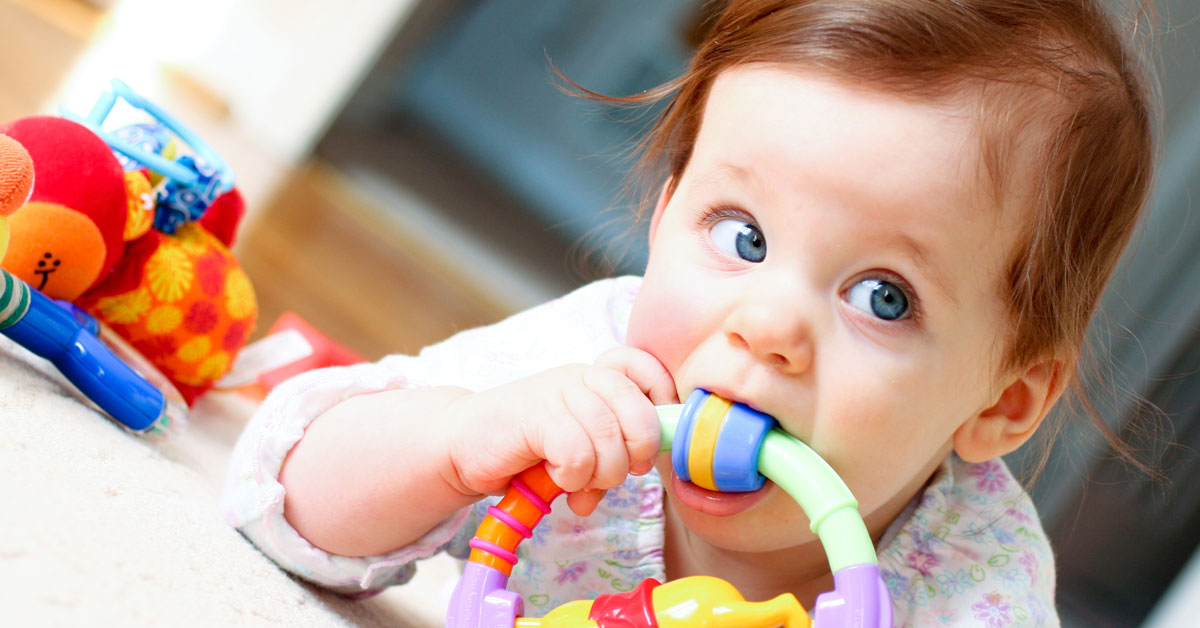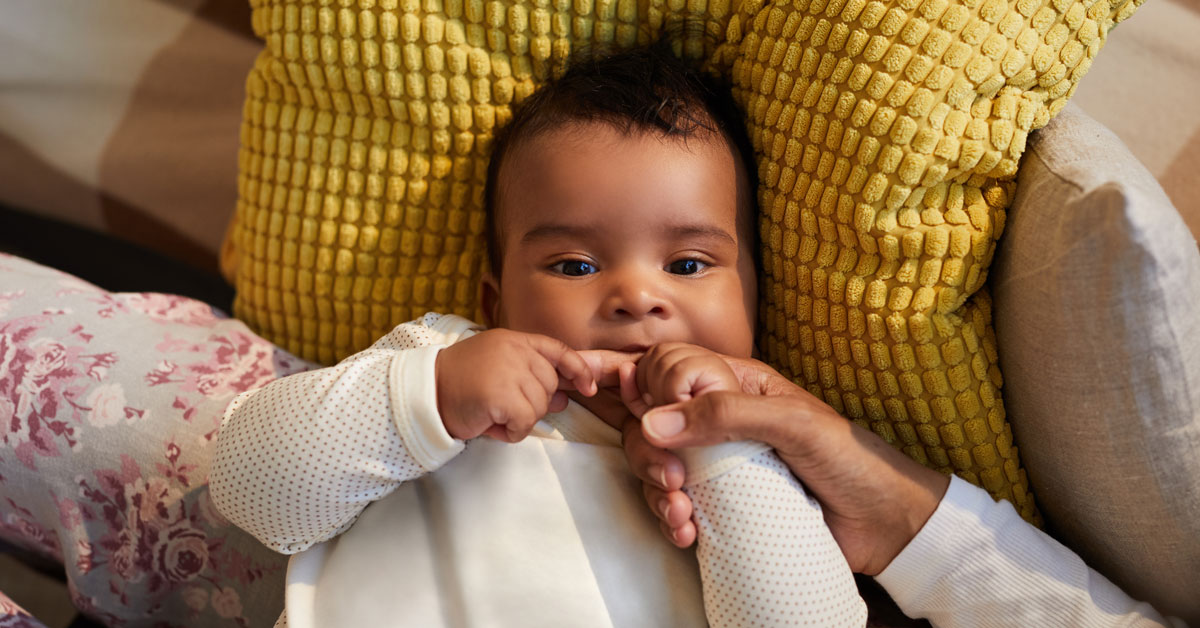Baby Has Cold Symptoms Diarrhea Not Eating Well

Teething tin can be a time of neat frustration for caregivers, in this post I will listing some of the most common symptoms, explicate how they relate to teething and share some insight on how to help soothe your little one during this potentially uncomfortable fourth dimension.
When Does Teething Begin for Infants?
Teething ordinarily starts effectually 4 to eight months with the lower forepart teeth and continues until thirty-36 months of historic period when the final set of molars appear. During the teething period there are symptoms that include irritability, disrupted slumber, swelling or inflammation of the gums, drooling, loss of appetite, rash around the mouth, balmy temperature, diarrhea, increased bitter and gum-rubbing and even ear-rubbing. These symptoms were reported past 70-80 percent of parents according to an article from the British Dental Journal. So, why don't all infants experience teething symptoms? Keep reading to find out.
Why Teething Symptoms May Exist Confused with Cold Symptoms
Research has pointed out that teething begins around six months of age. This is the same time when an babe's immunities they received from their mother, via the placenta, are diminishing. This means that the infant's own allowed system is becoming established. During this time, infants become vulnerable to minor infections. Because these two changes are taking place, the symptoms of teething can exist confused with a small-scale illness or cold and visa versa. This explains why but 70-80 per centum of parents reported teething symptoms of their infant; information technology's very likely that parents of the remaining 20-30 pct associated the symptoms to a pocket-sized illness or cold.
Below is a list of unremarkably reported teething symptoms, with ways to help your infant at dwelling house and when to telephone call the doctor:
- Irritability
- Drooling/Skin Rashes
- Coughing
- Biting and Gnawing
- Low Form Fever
- Cheek rubbing and ear pulling
- Diarrhea
Irritability
This is acquired by the discomfort of the teeth erupting through the gums. Frequently the get-go teeth and molars are the nigh uncomfortable.
How to help your infant's irritability: Cuddle, cuddle, cuddle! Every baby can use some good cuddle time when they are having a hard fourth dimension with teething. The extra time spent with your baby tin aid convalesce their pain, by providing feelings of being comforted and reassured.
Drooling/Skin Rashes
Teething can stimulate drooling and many babies drool a lot!
How to help your baby's drooling: Excessive drooling tin crusade a rash around the mouth, cheeks, chin and cervix expanse due to the extra bacteria on the skin from the saliva. Try to proceed the surface area as clean and as dry as possible by periodically wiping the area. Applying a elementary barrier cream can help with the dry out, chapped and sore pare.
Coughing
The extra saliva produced during teething can cause an occasional coughing or gag.
How to help your infant's coughing: If your baby's cough continues or is accompanied past a high fever and cold or flu symptoms, contact your baby's pediatrician. The loftier fever with cold and flu symptoms is not related to teething, simply is actually a sign that your babe is sick.
Biting and Gnawing
The counter pressure level from biting on practically annihilation tin can alleviate the pressure from nether the gums.
How to help your babe's bitter and gnawing:Annihilation cold works great! My best friend mixes water with the pouches of infant food and freezes them to brand fruit and veggie popsicles. There are teething rings, chew beads and any commercially bought teething toys tin can help, especially when chilled or frozen.
Low Course Fever
A low form fever is defined and caused by the following:
- A temperature ranging from 98-100 degrees.
- It can be caused by an babe putting their unclean hands in their oral cavity.
If the fever reaches in a higher place 101 degrees or continues, contact your infant'due south pediatrician because it may not be the teething just a more serious illness.
How to aid your baby's low grade fever: Use an age-appropriate hurting medication and delight consult your infant's pediatrician and the medication label for right dosage.
Cheek rubbing and ear pulling
This is caused by pain in the gums, which can travel to the cheek and ear, especially when the molars are erupting. Infants will rub those areas. Keep in heed that ear pulling or rubbing tin can also be a sign of an ear infection, please contact your baby'south pediatrician if this symptom continues or is accompanied with a high fever.
How to help your babe'due south cheek rubbing and ear pulling: Try rubbing and massaging the gums with a clean finger for one to two minutes to assist with the discomfort.
Teething and Diarrhea
Many believe that the increased saliva produced during teething can crusade stool to go slightly loose.Keep in mind, diarrhea can be a sign of a more than serious infection so contact your infant'due south pediatrician if the stool becomes watery, because your infant could exist at risk for aridity. Contacting your infant's pediatrician is particularly important if the diarrhea is accompanied by vomiting or a loftier fever.
I hope the list of symptoms and ways you can help your infant volition guide you through your infant'south teething stage. I also hope this helps ease the potential stress experienced by many parents. Just call back, that many symptoms we call back are teething can exist associated with illness, may exist completely unrelated to teething and may need to be addressed by a physician.
Related Content

- Tips for Teething Pain: What's Safe—and What's Not
- Amber Beads: Pretty to Look at, But is information technology Safe?
- Your Child'south Smiling Starts with Healthy Teeth
- Ensuring Lifelong Oral Health
Source: https://www.chla.org/blog/rn-remedies/your-infant-teething-know-the-signs-and-symptoms
0 Response to "Baby Has Cold Symptoms Diarrhea Not Eating Well"
إرسال تعليق